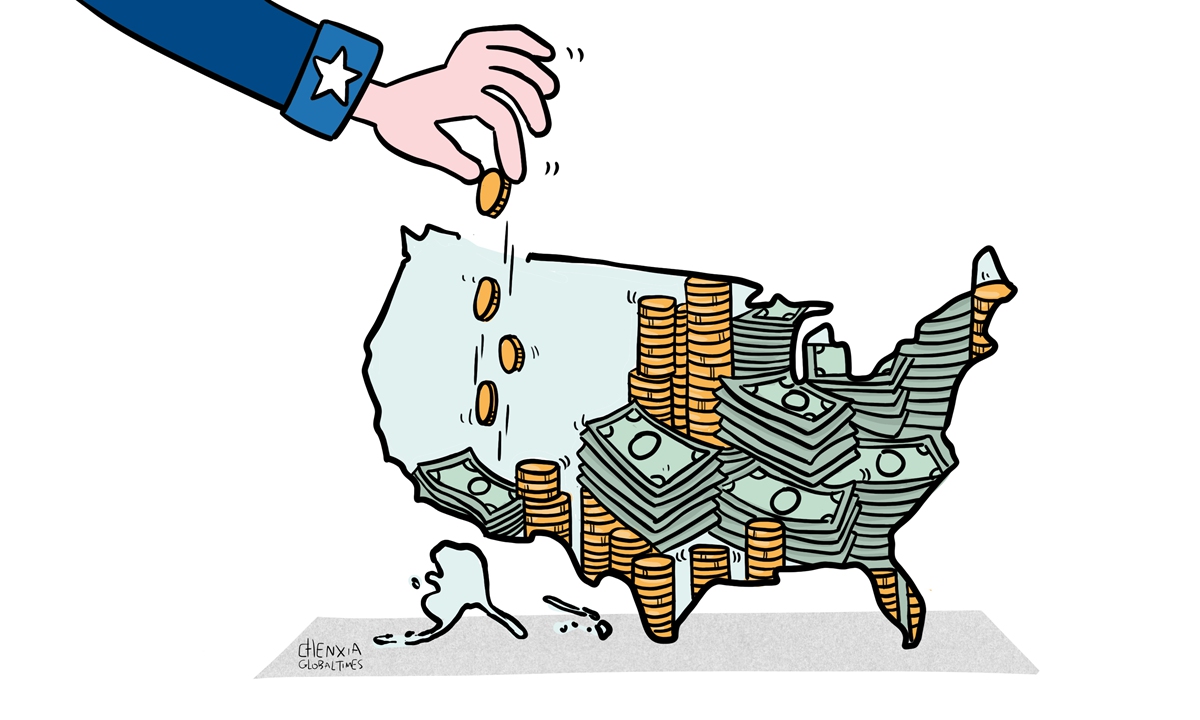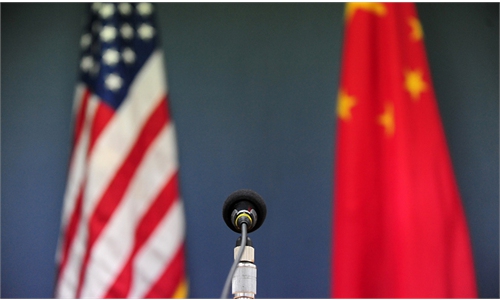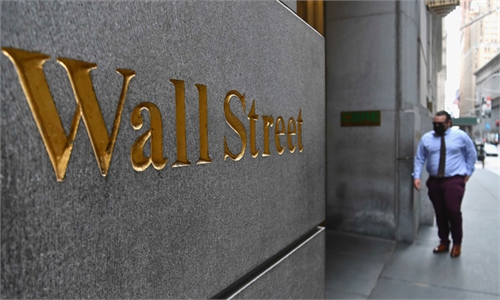COMMENTS / COLUMNISTS
Will Biden’s spending spree bring back pre-pandemic US economy?

Illustration: Chen Xia/GT
US President Joe Biden achieved his first major legislative victory after his coronavirus relief bill, priced at $1.9 trillion, cleared Congress and was quickly signed into law last week. On Thursday night, he gave his first prime-time policy address to American people from the White House, vowing to contain the pandemic quickly by accelerating vaccinations in all US states.The passage of the mammoth stimulus plan, which Biden's Republican opponents at the Capitol Hill alleged as unnecessary and wasteful, shows he is an experienced man of quick wit and action. At the current stage, Biden is determined to do as much as he can in order to put the catastrophic pandemic behind him as soon as possible - which will shape up his presidential legacy.
In his national speech, Biden put his political acumen and grit into full play, by promising to be truthful to American people, and by projecting empathy and a close connection to a broad range of ordinary Americans. He spoke of anxiety and loneliness behind closed doors, virus-induced job losses, hunger and evictions, tens of thousands of lost lives, and the time lost among family members and friends.
The Biden administration pledged that it will ratchet up inoculation efforts, by doubling the number of pharmacies participating in the federal vaccination project; more than doubling the number of federally-run mass vaccination centers immediately; delivering vaccines to an additional 700 community health centers; deploying 4,000 more active-duty troops to assist with vaccination; and certifying more professionals who can deliver shots into arms, which will include dentists, veterinarians and medical school students. The administration earlier announced that it will have enough doses to begin inoculating every American adult by the end of May.
Now, coronavirus infections and deaths are both dropping, compared to a previous voracious resurgence in winter, which is very encouraging. If the American government and its people can hang on for a few months by hastening inoculations, the pandemic will likely be under control by the summer, which is set to deliver the American people much-needed relief and time to heal after the prolonged trauma lasting more than a year.
Biden gave the American people a feeling of hope by cautiously setting the July 4th Independence Day for family barbecues and hugs with grandparents. But prior to that date, he asked Americans not to let up by slackening restrictive rules, including always wearing masks and keeping social distancing.
Although Biden did not mention his predecessor Donald Trump by name in the live-televised policy address, he censured the previous administration's incompetence by classifying the disease as "low risk" and playing down the severity of the coronavirus. "Denials for days, weeks, months, and that led to more deaths, more infections, more stress and more loneliness," Biden said.
As a matter of a fact, no one knows how many American lives were lost as Trump continued to ridicule mask-wearing. If he were able to tweet less, golf less, refrain from castigating reporters and mainstream US media outlets as "fake news", or even listened to American infectious disease experts like Dr. Anthony Fauci, more lives would have been saved.
Most notably, President Biden, in his speech, condemned what he said were "vicious hate crimes" targeting Asian Americans during the pandemic. "They're forced to live in fear for their lives just walking down streets in America," he said. "It's wrong, it's un-American, and it must stop." Those words are warming and show the Democrat president's character and decency.
Biden's US$1.9 trillion fiscal spending bill is also catalogued as one of the largest "anti-poverty" legislations in US history, as it will provide the largest federal infusion of aid to American poor for generations while expanding the child tax credit and subsidies for health insurance. It will change the whole paradigm of the US government by strengthening its rule in repairing an injured economy hit by a severe crisis.
The majority of low and middle-income individuals in the US will obtain a $1,400 direct payment, and Biden's federal government will disburse tens of billions of dollars to US states, cities, schools, organizations and struggling businesses. By redistributing massive amounts of money, the administration hopes the fiscal spending will reactivate the economy and create crucially-needed jobs.
President Biden said that his administration has been on a war footing so as to stifle the pandemic and rescue the battered US economy. A light can be seen at the end of the tunnel and "America is back", he stated.
However, the world must still wait a while to gauge whether his progressive stimulus plan will turn out to be a true success, as some well-known American economists are dubious about whether the White House's spending spree will pay for itself, or whether it will cause runaway inflation in the country. His administration, while focusing on the vaccination of most Americans, needs to join efforts to support the global vaccination effort sooner if the world wants to completely finish the job of weeding out the virus.
The author is an editor with the Global Times. bizopinion@globaltimes.com.cn



